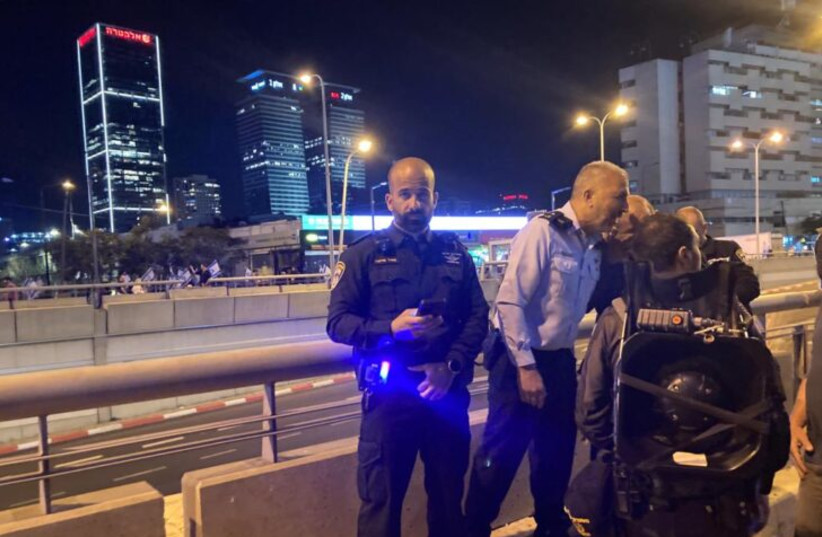National Security Minister MK Itamar Ben-Gvir refused on Wednesday to comply with a legal directive by the Attorney-General’s Office, according to which his promotion of a police officer indicted for throwing seven stun grenades at non-violent protesters was illegal.
According to numerous High Court of Justice rulings, including as recently as January 1, the legal interpretation by the attorney-general’s office legally binds the government. Ben-Gvir’s announcement that he refused to comply could therefore itself be deemed illegal.
Officer Meir Suissa was indicted in July along with four other police officers by the Police Investigations Unit for unlawfully throwing stun grenades at protesters against the government’s judicial reforms in March 2023. According to the indictment, Suissa threw seven stun grenades at protesters who were not acting violently, without being able to properly judge where they would land. At least two protesters were injured.
Suissa was charged with acting recklessly with explosive material, a crime which carries a maximum punishment of three years in prison.
Ben-Gvir initially intended to promote Suissa, in April, from Superintendent to Chief-Superintendent, and grant him command of a South Tel Aviv police precinct, but the promotion was delayed due to a petition against it to the High Court. The petition was dropped in late July following the indictment, after the state said that the police commissioner had not provided a required recommendation, indicating that the police were rethinking the promotion.

On July 31, Deputy Attorney-General Gil Limon clarified in a letter to Ben-Gvir that Suissa could not be promoted without an updated recommendation from the police commissioner, both due to the new legal circumstances following the indictment, and the fact that Asst.-Ch. Avshalom Peled had replaced Yaakov Shabtai as (interim) police commissioner.
However, on August 22, at the closing ceremony of a police command course in which Suissa participated, Ben-Gvir awarded Suissa the new rank and command of the precinct.
The promotion was a "done deal"
In a letter to Ben-Gvir on Sunday, Limon wrote that the promotion had not passed due process, and was therefore void. Limon wrote that the promotion “is against the law and harms the rule of law,” and that until an updated recommendation followed due process, which includes a discussion by the police high command, Suissa could not serve in the position.
Ben-Gvir responded to Limon in a letter on Monday that he would not respect the opinion as a recommendation by Peled had been handed in on August 21, one day before the ceremony, according to which Suissa could be promoted.
Ben-Gvir admitted that Peled had based the recommendation on the one given in April, but argued that the police high command in April had taken into account the possibility that Suissa would be indicted. According to Ben-Gvir, Peled still recommended promoting Suissa, among other reasons because the indictment showed that Suissa did not act out of malice and was not intentionally attempting to harm protesters.
Ben-Gvir said that if the attorney-general’s office believed that the promotion was illegal, it should appeal to the High Court, but until then the promotion was a “done deal.”
One of the proposed legal changes in last year’s judicial overhaul would have reduced the attorney-general’s legal interpretations to a recommendation only and would not be legally binding.
The bill was eventually dropped. However, in recent months ministers and the government as a whole have repeatedly ignored the attorney-general’s opinions, and have proceeded with steps deemed “not legally viable”.
These included the decision of the Ministerial Legislation Committee led by Justice Minister Yariv Levin to approve for legislation a proposal from 2022 regarding the drafting of haredi men into the IDF; a decision by the government to hire private representation in the court case against the haredi IDF exemption; a decision to continue providing haredi families whose fathers are of military age but continue yeshiva study with daycare subsidies; and more.
